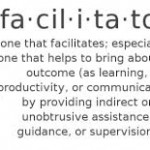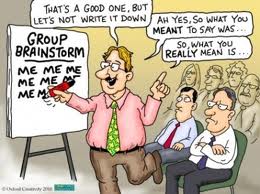Facilitation Skills
 Facilitation literally means “to make easier” and provides a framework to solve a particular problem, gain consensus to a course of action, or mediate in a conflict. Its usually carried out in either a large or small group setting.
Facilitation literally means “to make easier” and provides a framework to solve a particular problem, gain consensus to a course of action, or mediate in a conflict. Its usually carried out in either a large or small group setting.
There are a number of approaches such as group work, Action Learning, “world café”, topic based or “free flow”.
It combines a combination of intuitive and process skills such as:
- Really thinking through the preparation for a session and understanding something about who the audience are; many sessions fail before they start through poor preparation and not knowing the people attending!
- “Contracting” at the start of a session to ensure as best you can what people want from the session, and any hidden agendas there may be; its always worth taking time over this
- A more intuitive Facilitation skill is being able to read the group, and look for signs of body language; engaged or bored? Some people very quiet? Can you as a Facilitator be silent in order to encourage the group to talk?
- Being able to deal with difficult and challenging behaviour, as and when it arises. On the law of averages with a group of 12-15 people for example, there may well be someone who has a lot to say, perhaps at the expense of others
- Keeping the pace of the session appropriate, and ensuring that there is an end point/actions that people sign up to, and have an investment to follow through. Some sessions fall down on this; they have been active and fun, but have little follow through
What Facilitation is…on a good day
 Providing an objective eye
Providing an objective eye- It is the thing that’s needed to get people out of routine, to stop people time wasting and to get things moving forward
- Can break through historical barriers, accepted ways of doing things, people playing games, providing a focus for some tangible outcomes
What Facilitation is…on a bad day
- The opportunity for someone to air their views….endlessly
- Re-work old hurts and “the way things used to be”
- End in recriminations, and acrimony
- Lack of clear outcomes, perhaps from lack of clear objectives
The skills of a good facilitator
 Being prepared – know the materials and participants
Being prepared – know the materials and participants- Being aware of the needs of participants:– e.g. before: e.g. appropriate materials and timetable – during: the need to be flexible
- Understanding the limits and boundaries of what the group can give
- Bringing people and ideas together
- Acknowledging where good ideas are coming from
- Enabling people
- Recognising effort and struggle to participate
- Encouraging input, creating space for discussion and thinking
- Being aware of and using appropriate body language
- Establishing relationships quickly e.g. making an effort to remember participants names
- Recognising “baggage” and knowing when to deal with it
- Managing time
- Being comfortable and confident with themselves and their role
- Being skilled listeners
- Synthesising ideas and dialogue summarising and paraphrasing
